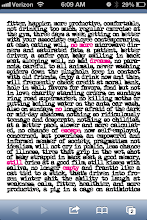I found Swifts essay "Hints Towards an Essay in Conversation" quite humorous. He pointed out every characteristic of open conversation and spoke of its evil. What he didn't do, however, was give any advice as to how these faults and evils of conversations could be remedied. The only thing he does suggest is that having women present in conversation would help regulate the tongue. But he also says that if women have any usefulness in conversation, this would be it. He sees himself as a "True Critick," one who "is a collector and discoverer of writer's faults." If anything, Swift seems to be advocating that there need to be more critics to bring regulation to writing and speech. Even though he doesn't mention it, I'm sure Jonathan Swift was not fond of poetry either for its lofty ways and crooked speech. What I think is even funnier is that these "faults" of conversation are still present even after 300 years...Swift, your essay obviously didn't persuade anybody.
Speaking of poetry, I really dislike poetry as well and agree with the criticisms of it. I really think that poetry is an over the top way of writing that is overly showy and made much more complicated than it needs to be. People will sit there and tear apart lines of twisted words and come up with things that the author probably never intended. I would say that I agree with the Female Tattler's critique of poetry. I also think it is important to note that the argument on poetry parallels the argument about critics: ancient vs modern. Why is it that everything that is "old" seems to be so much better than that which is new? Is it because more people have been able to look at the old stuff with a more critical eye and there seems to be more to say about it or is it because people are always more critical about what is happening in the present moment? Any time there is change (which there is a lot of that going on during this time period), people begin to freak out and latch onto what is "normal" or "consistent," not realizing that these things evolved from previous forms as well. Maybe these essays are more critiques on change than anything else....
Anyways I'm just rambling now....back to a more focused approach...
In this section of essays, there was evidence of a very important debate that was going on about the role of the critic. In this section alone, there is a representation of both sides (Jonathan Swift vs Edward Ward). Swift sees the need for a critic that points out the faults of society to help uplift it from the evils of folly and vice that are running rampant through England at this time. Swift also sees this as the role of the critic throughout history. Ward sees the role of the critic much differently. He thinks the modern critic is overly negative, only pointing out the bad while not offering any sort of advice on it or providing helpful feedback like the ancient critics did. I have to say I agree with Ward here because Swift's essay could have been much more effective if he would have provided feedback as to how to conduct a proper conversation and what a proper conversation is rather than only what it is not. As Ward points out, this type of criticism is completely unhelpful and almost useless because it serves no purpose except to propagate negativity. This often seemed to be the problem in the excerpts from The Spectator and The Tattler. The articles often provided what was wrong with society, but offered no feedback as to what was right or how to fix it. Simply pointing out the problem and making people aware of it doesn't fix it. But at the same time, writing essays which simply "criticize" socity provide fuel for discussion in coffehouses and other forms of conversation, even if it is consistant with everything Swift said not to do....
Sunday, February 8, 2009
Subscribe to:
Post Comments (Atom)




No comments:
Post a Comment